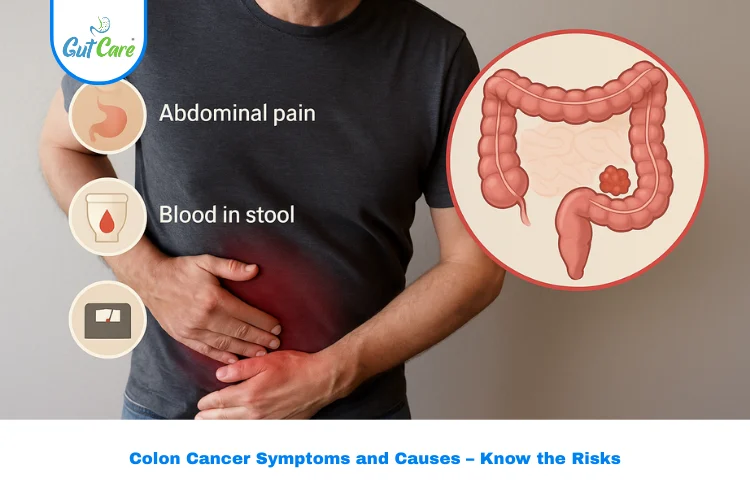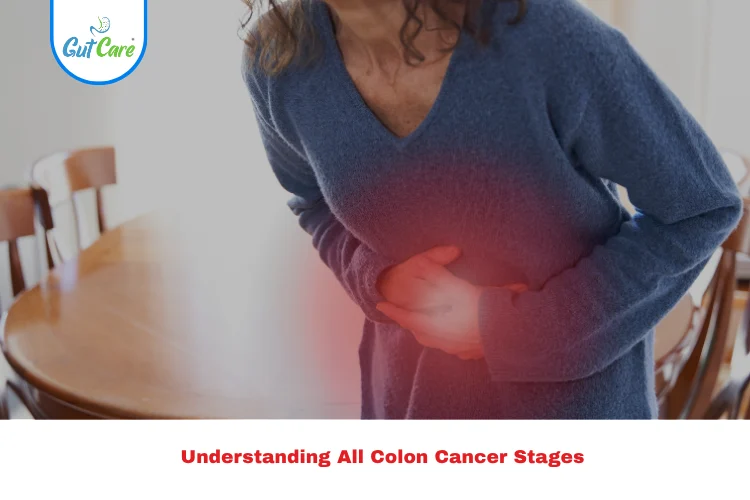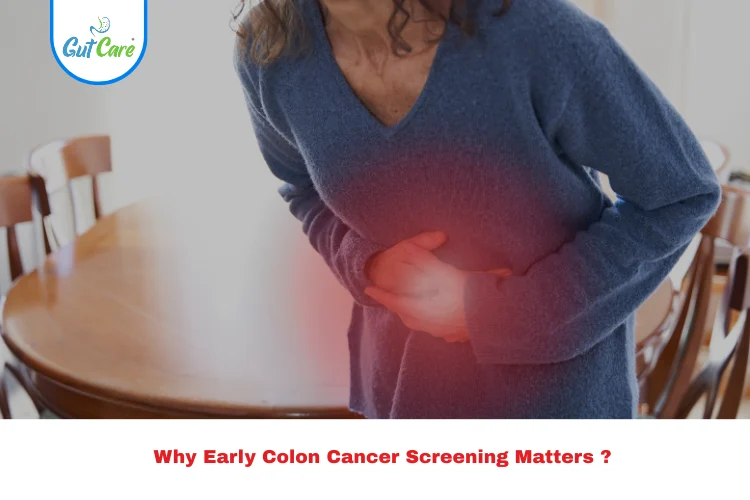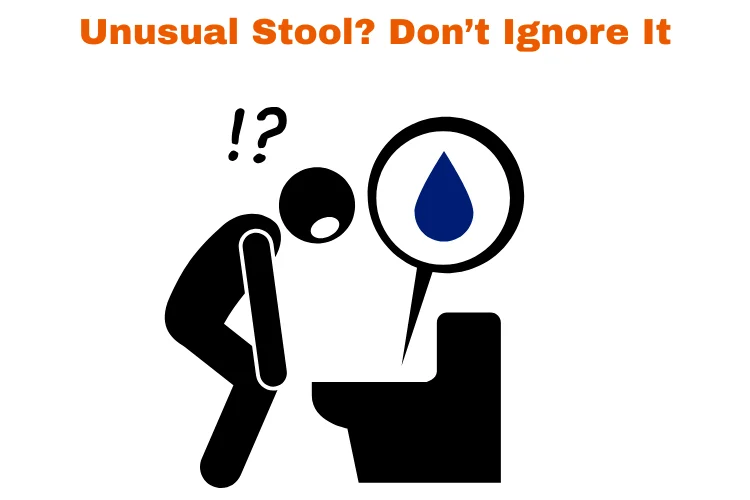Most of us don’t pay much attention to changes in our digestion or bowel habits. A little constipation here, a little stomach pain there — it’s easy to brush these things aside. But sometimes, those small signals are our body’s way of warning us about something more serious.
One such condition is colon cancer. Spotting colon cancer symptoms early gives patients the best chance at treatment and recovery. At Gutcare Clinics in Bangalore, we often meet patients who come in late because they assumed their symptoms were “normal.” That’s why specialists like Dr. Yuvrajsingh Gehlot, a highly experienced colorectal surgeon, emphasize awareness as the first step in prevention.
In this guide, let’s break down what colon cancer really is, the symptoms to watch out for, what causes colorectal cancer, and the treatment options available.
What exactly is Colon Cancer?
Colon cancer begins in the large intestine, often from small clumps of cells called polyps. While polyps themselves aren’t always dangerous, some can turn cancerous if not removed. The disease can be silent in its early stages, which makes knowing the signs even more important.
Common Colon Cancer Symptoms
Colon cancer doesn’t look the same for everyone, but here are some of the colon cancer symptoms:
- Changes in bowel habits – Ongoing constipation, diarrhea, or narrow stools.
- Blood in stool – Bright red or dark, tarry stools may indicate bleeding inside.
- Persistent abdominal discomfort – Cramping, bloating, or gas that doesn’t settle.
- Fatigue or weakness – Often caused by hidden blood loss leading to anemia.
- Unexplained weight loss – Losing weight without trying is always worth checking.
If you notice these symptoms lasting more than a couple of weeks, don’t ignore them.
Symptoms of Colon Cancer in Male
While men and women share many signs, there are some patterns more common in men. Typical symptoms of colon cancer in males include:
- Frequent urge to use the bathroom, especially at night.
- Black or tarry stools (a sign of hidden bleeding).
- Feeling full even after small meals.
- Trouble passing stool.
Men often dismiss these as “just age catching up,” which can delay diagnosis.
Symptoms of Colon Cancer in Women
Women may experience additional or slightly different warning signs. Some colon cancer symptoms in women include:
- Fatigue related to anemia, often mistaken for regular tiredness.
- Abdominal pain that overlaps with menstrual cramps.
- Long-term changes in stool consistency.
- Occasional rectal bleeding confused with hemorrhoids.
Because these colon cancer symptoms overlap with gynecological conditions, women should be extra cautious.
What Causes Colorectal Cancer?
There isn’t just one answer to what causes colorectal cancer. Instead, it’s a mix of factors:
- Family history: If a parent or sibling has had colorectal cancer, your risk is higher.
- Lifestyle choices: A diet high in red or processed meat, smoking, and heavy alcohol use are known triggers.
- Chronic conditions: People with Crohn’s disease or ulcerative colitis face a higher risk.
- Age: Most cases occur in people over 50.
- Weight and activity: Being overweight and not exercising enough contribute significantly.
Risk Factors
Apart from causes, there are certain conditions that increase vulnerability:
- Type 2 diabetes
- Previous cancer treatments (like abdominal radiation)
- Ethnicity (some populations are at higher risk)
Treatment for Colon Cancer
The good news is that treatment options have advanced dramatically. Treatment for colon cancer depends on the stage at diagnosis:
- Surgery: Removal of cancerous growths is the most common treatment. At Gutcare Clinics, Dr. Yuvrajsingh Gehlot uses minimally invasive methods whenever possible.
- Chemotherapy: Often used to shrink tumors or kill remaining cancer cells post-surgery.
- Radiation therapy: Typically used for rectal cancers.
- Targeted and immunotherapy: Modern treatments that attack cancer cells more precisely and boost the body’s immune defense.
When Should You Consult a Doctor?
If you’ve had bowel changes, rectal bleeding, or unexplained fatigue lasting more than two weeks, book a consultation. Early detection can mean the difference between a simple surgery and more aggressive treatment.
At Gutcare Clinics, Bangalore, patients have access to comprehensive care, from screening to advanced treatment options under the expertise of a skilled colorectal surgeon.
Prevention and Lifestyle Choices
You can lower your risk by making a few consistent lifestyle changes:
- Eat more fiber-rich foods (fruits, vegetables, whole grains).
- Exercise at least 30 minutes most days.
- Maintain a healthy weight.
- Quit smoking and limit alcohol.
- Get regular colonoscopy screenings after 50 (earlier if you have family history).
Final Thoughts
Colon cancer doesn’t always announce itself loudly. Often, the early colon cancer symptoms are subtle — but paying attention to them can save your life. Whether you’re a man or a woman, knowing what’s normal for your body and speaking up when something feels off is crucial.
If you’re concerned about symptoms or have risk factors, don’t wait. Reach out to an expert like Dr. Yuvrajsingh Gehlot at Gutcare Clinics, Bangalore. The earlier you act, the better the chances for a healthy outcome.
FAQs About Colon Cancer
1. What are the earliest colon cancer symptoms?
They include persistent bowel changes, blood in stool, and unexplained weight loss.
2. What causes colorectal cancer?
It usually results from a combination of genetic factors, poor diet, lack of exercise, and certain medical conditions.
3. What are common symptoms of colon cancer in women?
Fatigue from anemia, abdominal pain, rectal bleeding, and stool changes are the most common.
4. How is treatment for colon cancer decided?
Doctors consider the stage of cancer, overall health, and personal preferences to choose between surgery, chemotherapy, radiation, or targeted therapy.
5. Where can I get expert treatment for colon cancer in Bangalore?
You can consult Gutcare Clinics, Bangalore, where Dr. Yuvrajsingh Gehlot, an experienced colorectal surgeon, offers advanced care and personalized treatment.




